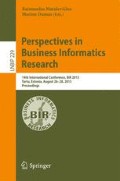Abstract
Current paper attempts to identify and categorise the most prominent software development concepts at present time. To achieve that, we employed the method of text mining on weblogs written by software development practitioners. Large volume of text extracted from the most popular professional blogs provided basis for frequency analysis of relevant concepts. These concepts were then categorised using a recognised ontology of software development. The results of this study can be used for updating an existing software development ontology, for constructing checklists to be used by both technical specialists and inexperienced clients prior to starting a software project and, finally, for constructing relevant courses and trainings for non-technical clients.
Access this chapter
Tax calculation will be finalised at checkout
Purchases are for personal use only
References
Year of Code. http://www.yearofcode.org
Hour of Code. http://code.org
The UK Hour of Code. http://uk.code.org/
Shein, E.: Should everybody learn to code? Commun. ACM 57(2), 16–18 (2014)
Butler, T., Fitzgerald, B.: A case study of user participation in the information systems development process. In: Kumar, K., DeGross J.I. (eds.) Proceedings of the 18th International Conference on Information Systems, pp. 411–426. Association for Information Systems, Atlanta, GA (1997)
Majchrzak, A., Beath, C.M., Lim, R.A., Chin, W.W.: Managing client dialogues during information systems design to facilitate client learning. MIS Q. 29(4), 653–672 (2005)
Takats, A., Brewer, N.: Improving communication between customers and developers. In: Proceedings of the Agile Development Conference, pp. 243–252. IEEE Computer Society, Washington, DC (2005)
Shim, J.T., Sheu, T.S., Chen, H.-G., Jiang, J.J., Klein, G.: Coproduction in successful software development projects. Inf. Softw. Technol. 52(10), 1062–1068 (2010)
Martin, A., Noble, J., Biddle, R.: Programmers are from Mars, Customers are from Venus: A practical guide for customers on XP Projects. In: Proceedings of the 2006 Conference on Pattern Languages of Programs, pp. 1–9. ACM, New York (2006)
Dorn, B.: Reaching learners beyond our hallowed halls. Commun. ACM 54(5), 28–30 (2011)
Cerpa, N., Verner, J.M.: Why did your project fail? Commun. ACM 52(12), 130–134 (2009)
Nelson, R.R.: IT project management: infamous failures, classic mistakes, and best practices. MIS Q. Executive 6(2), 67–78 (2007)
Hoda, R., Noble, J., Marshall, S.: The impact of inadequate customer collaboration on self-organizing agile teams. Inf. Softw. Technol. 53(5), 521–534 (2010)
Ojastu, D., Robal, T., Kalja, A.: Expectations of software development practitioners for non-technical clients. In: Databases and Information Systems VIII: Selected Papers from the Eleventh International Baltic Conference, Baltic DB&IS 2014, pp. 317–330. IOS Press, Amsterdam (2014)
Tena, S., David D., Paloma D., Ignacio A.: Bridging the communication gap: a user task vocabulary for multidisciplinary web development team. In: Proceedings of the 13th International Conference on Interaccion Persona-Ordenador. ACM, New York (2010)
Lenin Babu, T., Seetha Ramaiah, M., Prabhakar, T.V., Rambabu, D.: ArchVoc – towards an ontology for software architecture. In: 2nd Workshop on Sharing and Reusing Architectural Knowledge - Architecture, Rationale, and Design Intent. ACM, New York (2007)
Liping, Q., Lidong, W.: A study on IT-security vocabulary for domain document classification. In: 7th International Conference on Computational Intelligence and Security, pp. 521–525 (2011)
Speretta, M, Gauch, S.: Using text mining to enrich the vocabulary of domain ontologies. In: ACM International Conference on Web Intelligence and Intelligent Agent Technology, pp. 549–552 (2008)
Faatz, A., Steinmetz, R.: Ontology enrichment with texts from the WWW. In: Proceedings of the 1st Semantic Web Mining Conference at the ECML (2002)
Plangprasopchok, A., Lerman, K.: Constructing folksonomies from user-specified relations on flickr. In: Proceedings of the 18th International Conference on World Wide Web, pp. 781–790 (2009)
Barua, A., Thomas, S.W., Hassan, A.E.: What are developers talking about? An analysis of topics and trends in stack overflow. Empirical Softw. Eng. 19(3), 619–654 (2014)
Lambiotte, R., Ausloos, M., Thelwall, M.: Word statistics in blogs and RSS feeds: towards empirical universal evidence. J. Informetrics 1(4), 277–286 (2007)
Agarwal, N., Liu, H., Tang, L., Yu, P.S.: Identifying the influential bloggers in a community. In: Proceedings of the International Conference on Web Search and Web Data Mining, pp. 207–218. ACM, New York (2008)
Miner, G.: Practical Text Mining and Statistical Analysis for Non-structured Text Data Applications. Academic Press, Oxford (2012)
Bourque, P., Fairley, R.: SWEBOK 3.0: Guide to the Software Engineering Body of Knowledge. http://www.computer.org/portal/web/swebok (2014). IEEE Computer Society Press
Acknowledgements
This research was partially supported by the European Union through the European Regional Development Fund (ERDF).
Author information
Authors and Affiliations
Corresponding author
Editor information
Editors and Affiliations
Rights and permissions
Copyright information
© 2015 Springer International Publishing Switzerland
About this paper
Cite this paper
Ojastu, D., Robal, T., Kalja, A. (2015). The Most Prominent Software Development Concepts Cited in IT Professionals’ Blogs. In: Matulevičius, R., Dumas, M. (eds) Perspectives in Business Informatics Research. BIR 2015. Lecture Notes in Business Information Processing, vol 229. Springer, Cham. https://doi.org/10.1007/978-3-319-21915-8_13
Download citation
DOI: https://doi.org/10.1007/978-3-319-21915-8_13
Published:
Publisher Name: Springer, Cham
Print ISBN: 978-3-319-21914-1
Online ISBN: 978-3-319-21915-8
eBook Packages: Computer ScienceComputer Science (R0)

